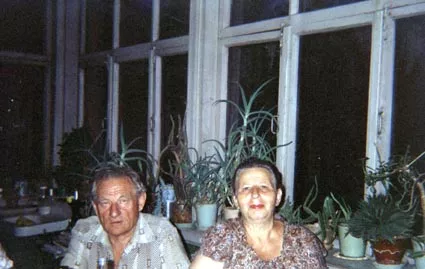This is me and my husband Efim Brener in our apartment. The picture was taken in Tallinn, 2005.
My husband and I moved to Tallinn in 2000. We sold our house in Tashkent and bought an apartment in a new district of Tallinn. Of course, it was easier for us. The district, where we are living, has very good infrastructure. Everything is close by: the polyclinic, pharmacy, post-office and stores. We feel independent.
Life in Estonia is well organized. The Estonian government is very benevolent to my husband, who went to the motherland of his exiled wife. My husband had a high pension, but Estonia and Uzbekistan didn’t have any agreements, so his pension wasn’t considered here. But he was given a pension here, even a card for free medical treatment and discounts for medicine. It is really important at our age. My husband and I had to go through difficult operations here. Efim has a permanent residential permit, which is difficult to get here. The state is supporting us. None of us regrets leaving Tashkent.
Twice a week Efim goes to the synagogue, to the religious Jewish community. He prays and communicates with people. I rarely leave home and it is pretty hard for me. I always go to the synagogue on the commemoration day of my parents, it is sacred for me. Of course, it is hard for both of us that the graves of our loved ones remained in Tashkent. We will probably never have a chance to go there again. There is a memorable plaque in the synagogue. People can order a block there, where parents’ and relatives’ names are written. It is pretty expensive, 1000 krones [about USD80], but I put one for my parents and grandparents there. It is memorable. Efim put one for his parents there, too.
We always attend meetings held annually on 14th June, the day of deportation. We also mark Jewish holidays. We keep in touch with the Uzbek community. It is rather small in Tallinn. There are very few Uzbeks there. Many people go there because they used to live in Uzbekistan. We also follow traditions of Uzbekistan, as it has become a second motherland for both of us. Uzbeks saved me – gave me lodging, work and skills. I lived in Tashkent for 50 years. It was a long and happy life.
The chairman of the community, a pure Uzbek, preserves all Uzbek traditions and one of them is to treat elderly people with respect. We are always invited there and we feel the warmth. The community is not funded to hand out treats. We have a potluck party, that means that everybody brings what he has. We sit at the table and talk. We are grateful to the fate for being alive, having good children and grandchildren, being together. That is really a lot.





















